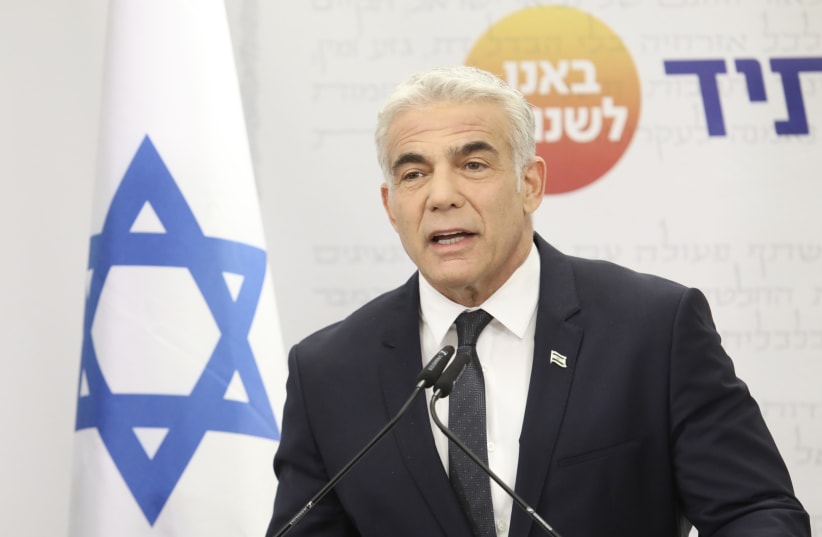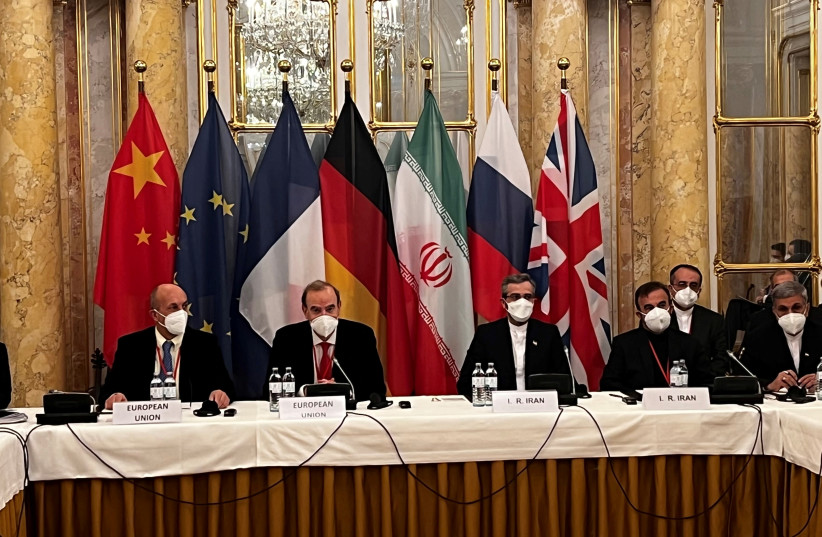Israel is prepared to act alone against Iran if needed, Foreign Minister Yair Lapid warned hours before the eighth round of talks to revive the 2015 Iran deal began in Vienna on Monday evening.
“Of course, we prefer to act in international cooperation, but if necessary, we will act alone,” Lapid told the Knesset Foreign Affairs and Defense Committee. “We will defend ourselves by ourselves,” he emphasized.
“We have presented our allies with quite a bit of firm intelligence” about Iran’s nuclear program, Lapid said. This was not just “opinions and positions, but concrete intelligence that proves Iran is deceiving the world in a completely systematic way,” Lapid said.
“All they [Iran] care about is that sanctions are lifted and billions of dollars are poured into its nuclear program” and that funds are funneled to “Hezbollah, Syria, Iraq [and] the terrorist network they have deployed around the world,” Lapid said.
Iran immediately accused Israel of sabotaging the talks.
“The Zionist occupiers have never hidden their complete opposition to any regional or international arrangements that would lead to the resolution of issues in the region,” Iran’s Foreign Ministry Spokesman Saeed Khatibzadeh said.
“The [Zionist] regime is rooted in insecurity and terror,” he said. “The life of this regime lies in terror, insecurity and discord.”
Israel opposed the original Iran deal, known a the Joint Comprehensive Plan of Action (JCPOA) that was signed between Iran and the six world powers: the United States, Russia, China, France, Germany and the United Kingdom.
Former US president Donald Trump exited the deal in 2018 and reimposed crippling sanctions on Iran. Tehran in turn has halted its compliance with the deal and has inched toward the production of weapons-grade uranium.
US President Joe Biden has sought to revive the deal, with the European Union brokering a process by which seven rounds of indirect talks have been held.
Israel has opposed the revival of the deal and has warned the signatories to the agreement of the dangers of both protracted negotiations, the resumption of the JCPOA or the arrival at a new deal that would fail to halt a nuclear Iran.
“Today, nuclear talks in Vienna resume,” Lapid said. “Israel’s main foreign policy and challenge are to prevent the Iranian nuclear program,” he emphasized to the FADC. “In recent months, we have had an intensive dialogue with all the countries involved in these negotiations.”
Last week, US National Security Advisor Jake Sullivan was in Israel to discuss the talks and met separately with Prime Minister Naftali Bennett, Defense Minister Benny Gantz and Lapid.
The foreign minister referenced his talks with the US but said he had also been to Moscow, Paris and London to discuss the matter.
“We have told everyone clearly: Israel will not let Iran become a nuclear threshold state,” Lapid said.
Israel, he said, supports diplomacy as a preferred option in dealing with Iran.
“Israel does not oppose any agreement. A good agreement is good. We oppose any agreement that does not allow for real oversight neither of the Iranian nuclear program, nor of the Iranian money, nor of the Iranian terrorist network,” he clarified.
IN VIENNA, the Russian ambassador to the talks, Mikhail Ulyanov, speculated on Twitter that this could be the final round of talks, as he held a number of meetings in advance of the Vienna negotiations, including with European Union coordinator Enrique Mora, US Special Envoy for Iran Robert Malley and the delegations of China and Iran.
“Today, all parties have agreed to come back to activate the eighth round of negotiations even in [the] Christmas and New Year’s holiday,” China’s top envoy Wang Qun told reporters. “This in itself fully shows a greater sense of urgency on the part of all parties concerned.”
These talks, like past rounds, will be held indirectly. Iran refuses to meet directly with US officials, meaning that other parties must shuttle between the two sides. The United States has repeatedly expressed frustration at this format, saying it slows down the process, and Western officials still suspect Iran is simply playing for time.
The 2015 deal extended the time Iran would need to obtain enough fissile material for a nuclear bomb if it so chooses, to at least a year from around two to three months. Most experts now say that time is less than before the deal, though Iran says it only wants to master nuclear technology for civil uses.
“The most important issue for us is to reach a point where, firstly, Iranian oil can be sold easily and without hindrance,” Iranian media quoted Foreign Minister Hossein Amirabdollahian as saying before the talks resumed.
“The money from the oil [sales] is to be deposited as foreign currency in Iranian banks so we can enjoy all the economic benefits stipulated in Joint Comprehensive Plan of Action,” he said.
Oil exports, Iran’s main revenue source, have plunged under the US sanctions. Tehran does not disclose data, but assessments based on shipping and other sources suggest a fall from about 2.8 million barrels per day (bpd) in 2018 to as low as 200,000 bpd currently. One survey put exports at 600,000 bpd in June.
The nuclear talks have made scant progress since they resumed last month after a five-month hiatus following the election of hardline Iranian President Ebrahim Raisi.
“Today, there is an acceptable joint document on the negotiating table that we call the December 1 and December 15 documents,” Amirabdollahian said. Both documents, he said, related to the nuclear issue as well as US sanctions.
“From today, our negotiations will start on the basis of this joint document. Guarantees and verification are among the issues on the agenda,” Amirabdollahian said.
Iran’s two draft texts, submitted on November 26 in Vienna, were modified versions of those drawn up in June under the previous Iranian administration.
Iran’s position is that all US sanctions must be lifted before steps are taken on the nuclear side, while Western negotiators say nuclear and sanctions steps must be balanced.
“This round of negotiations will focus on sanctions-lifting,” China’s Wang said. Diplomats said the last round was focused mainly on nuclear restrictions, though Western powers said too little progress was made.
When the seventh round wrapped up, incorporating some Iranian demands, negotiators from France, Britain and Germany said in a statement, “This only takes us back nearer to where the talks stood in June,” when the previous round ended.
“We are rapidly reaching the end of the road for this negotiation,” they added.
Reuters contributed to this report.

